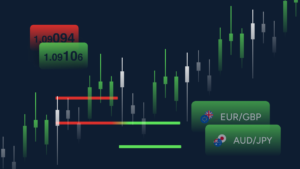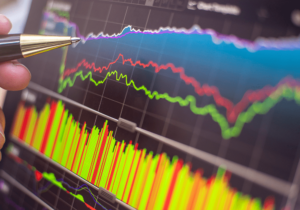Trading is all about knowledge and strategy, but more often than not, it’s all up to your mindset. The psychology of trading—fear, greed, impatience, overconfidence—these are major factors in one’s decision-making process and, therefore, eventual success or failure in the markets.
Successful traders know well enough that keeping emotions in check and being mentally disciplined are very important, just like knowledge of charts, market trends, and technical indicators. Herein discussed is the psychology of trading and some practical tips on how to master your mind in order to improve your trading results.

Why Psychology Matters in Trading?
Trading is more than just an analytical exercise; it is an emotional and psychological one as well. The volatility of financial markets can cause stress, excitement, and anxiety, making it difficult to make rational decisions. This emotional rollercoaster can cloud your judgment and lead to poor trading choices, such as chasing losses, deviating from your trading plan, or overtrading.
Success in trading is not only about choosing the right trades but also about managing one’s emotional responses to both gains and losses. By being in better control of your emotions, you will be able to make decisions that are more logical and better considered, which will be in line with your long-term goals.
Common Psychological Challenges in Trading
Fear of Loss (Loss Aversion)
Fear is one of the strongest emotions in trading. Most traders are afraid of losing money, and out of this fear, they end up making emotional decisions instead of logical ones. This may happen in various ways: holding on to losing positions in anticipation of a turnaround or closing profitable trades at an early stage due to the fear of losing an already achieved profit. Loss aversion is a psychological bias where the pain of losing is more psychologically intense than the pleasure derived from gaining.
Overcoming this fear requires embracing the fact that losses are part of the trading game. All traders incur losses, which can be used as an excellent learning curve. Besides, risk management tools such as stop-loss will limit your losses and make you feel more confident in your decisions.
Greed and Overtrading
The other major psychological challenges most traders face involve greed. When on a winning streak, traders often become overconfident and may start overtrading, holding too many positions or more than your account can allow. Greed might eventually blind you from the facts as you start discarding the risk management rules in search of profits.
To overcome greed, one should always stick to a disciplined trading plan. Set a risk tolerance and profit targets for any trade beforehand. Also, avoid the temptation to “chase the market” or to constantly seek new trades in hopes of maximizing gains. Patience is a virtue in long-term trading success.
Impatience and FOMO (Fear of Missing Out)
Impatience is a psychological problem common in individuals and results in poor decision-making. The traders get too eager for the profits arising and dive into trading before proper analysis or planning. They get into trades at the most unwanted prices, chase trends, or enter positions without consideration of all the relevant factors.
Impatience is often coupled with the fear of missing out (FOMO). The latter may compel a trader to jump into trading for emotional rather than strategically thought-out reasons, thus causing one to act erratically and not consistently.
The solution to avoid FOMO is that a trading strategy should be followed patiently. A trader should have a set of rules for entry of trade and should never be impulsive based on market action or feelings. Disown the feeling of missing out and let your trades per plan be materialized.
Over-Confidence and Confirmation Bias
Another trap for traders is overconfidence. After a string of successful trades, traders may begin to feel that they have mastered the markets and start making high-risk bets. This overconfidence can lead to poor judgment and significant losses. It is important to remain humble and understand that the markets are unpredictable.
The second manifestation of overconfidence is confirmation bias. Traders seek to confirm a pre-existing belief while averting any data that could refute their thinking. Confirmation bias prevents traders from making decisions objectively to adjust to changed conditions by readjusting their strategies.
Overcome overconfidence by objective assessment of trades and not being misled by previous successes. Never think that you have learned enough; remain humble with any amount of experience.

Trading Psychology: How to Master It
To be successful as a trader, you need to learn to manage your emotions and adopt a mindset that will promote disciplined, rational decision-making. Following are several ways to master the psychology of trading:
Develop a Trading Plan and Stick with It
A good trading plan lays the foundation for psychological management in trading. This should include your trading objectives, risk management, entry and exit criteria, and position sizing. A clear set of guidelines to adhere to will lower the chances of emotional decision-making and allow you to keep your focus on your long-term objectives.
One of the keys to a trading plan is adhering to it. When the losses or market decline arises, many traders would find it very difficult not to go their own way and stick to their strategy. However, the mistake of deviation from the trading plan is committed by many. Consistency is key to success, so have confidence in your strategy and stick with it, no matter how unpredictable the market may get.
Manage Your Risk
One of the best ways to handle the ups and downs of emotions with trading is proper risk management. By using stop-loss orders and setting your risk limits for every trade, you avoid great loss, which causes emotional responses like fear and panic. The concept of risk management gives you a sense of control and makes you focus on the big picture.
Whereas you should have only a very small percentage of your account risk in each trade—normally 1-2%, so that you would not face emotional ups and downs or lose a huge chunk of your portfolio because of a single trade.
Take Breaks and Manage Stress
Trading can be psychologically and emotionally taxing, especially when market volatility is at its height. It’s necessary to stand away from time to time, rest, and recharge. Watching the markets or stressing over open positions continuously could lead to burnout and make one prone to poor decision-making.
Create regular activities that take you away from the markets and then your mind away from the markets. Take intraday breaks; exercise or meditate. You must learn to manage stress and maintain a healthy balance in life, since bad stress management will swiftly blur your judgment and deteriorate your emotional well-being.
Trading Journal
One of the most powerful ways to work on your trading psychology is through maintaining a trading journal. Writing down each trade, reasons for taking the position, your feelings during the trade, and the result really can help you gain valuable insights into what you’re good and bad at psychologically.
By regularly going through the journal, you will notice patterns in your behavior—for instance, periods of impulsive trading, fearful actions, or overconfidence. Contemplation upon such patterns allows for an adjustment of one’s mind and a gradual perfecting of trading discipline.
Focus on Long-Term Goals and Avoid Short-Term Obsession
Too many traders get too wrapped up in short-term gyrations and focus on immediate profits or losses. This will surely provoke stress, anxiety, and impulsive decisions. Successful traders view long-term objectives and understand that trading is a marathon and not a sprint.
Set realistic goals for your performance and track your progress through time. View any losses as a part of the process and don’t let those define your worth as a trader. In such a way, keeping the long-term view will help to avoid making decisions based on temporary setbacks in your emotionally driven goals.
Conclusion:
The psychology of trading is at the heart of an individual’s ultimate success or failure. Emotions—like fear, greed, impatience, and overconfidence—can bring forth precipitating irrational decisions, perhaps leading to losses, while a disciplined, patient mindset can carry a trader through the ups and downs of the markets more successfully. You will improve your trade if you have a workable trading plan, apply the principles of risk management, and apply emotional management techniques that will assure long-term success.
Remember, trading is not only about strategy and technical analysis; it’s about mastering your mind and making rational decisions under pressure. Understanding and managing your psychological challenges is the key to unlocking your full potential as a trader and consistently achieving better results.
Table Of Content
Recent Posts
- Top 10 Commodities

- Top 5 Forex Trading Strategies for Consistent Profits in 2025 (All You Need to Know)

- Day Trading vs. Position Trading in Commodities: Which Strategy Works?

- Best Crypto Trading Strategy in 2025: Learn How to Trade Cryptocurrency in 5 Easy Steps!

- The Role of Technical Indicators in Trading: Enhancing Your Analysis


